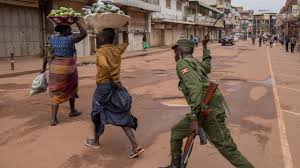By CHANGE OF GUARDS
“…….and why should soldiers be used in land evictions? What are they doing there? They are not policemen.”
– Museveni, February 2024.
Uganda’s military dictator operates a private army that consumes a significant portion of the national budget. He personally established this army and vehemently opposes any efforts to transform it into a national institution. Articles 208 and 209 of the Constitution outline the primary role of the national army as the preservation and defense of Uganda’s sovereignty and territorial integrity. Additionally, it mandates cooperation with civilian institutions during emergencies and national disasters. Furthermore, it aims to foster harmony and understanding between civilian and defense forces and engage in productive activities for Uganda’s development.
There is currently no visible potential threat to the territorial integrity of Uganda from any other country. However, the so-called combat preparedness has been taking a toll on the national economy. Unfortunately, the substantial defense budget contradicts the deplorable general welfare of ordinary soldiers. This occurs because the defense budget serves as a conduit for siphoning national resources, with the remainder being appropriated by the top echelons in exchange for loyalty to Museveni. Consequently, the self-styled ADF terrorists continue to infiltrate the country at will from the DRC. Armed Kenyan cattle rustlers freely penetrate the northeastern region, causing havoc. South Sudanese military personnel repeatedly make incursions into Uganda, also contributing to unrest. Armed bands harass Ugandan fishermen on Lake Albert, and there are allegations of the Rwandan army killing Ugandans within the country. The list of violations of sovereignty and territorial integrity is extensive.

Despite ongoing disasters and emergency situations, the army has not been involved due to a lack of preparedness in terms of will, logistics, and training. Whether it’s occasional landslides in the eastern region, floods in the Rwenzori, or disastrous famine and hunger in Karamoja, the army offers no assistance. During politically motivated Covid-19 lockdowns, the army featured prominently in the enforcement of measures and inefficient food distribution, seemingly for sinister motives. Attempts to establish production centers for military personnel have been deliberately mismanaged. The last such stock farm under NEC at Kisozi was appropriated by Museveni. The only surviving enterprise, Luwero Industries, appears to be more of a regime’s private affair, with ordinary soldiers making minimal contributions. Museveni’s highly publicized Engineering Brigade seems to serve as a facade for Chinese construction firms and another channel for siphoning off national resources.
Consequently, this state of affairs has compelled the military institution to redundantly engage in activities outside its core mandate. This redundancy is evidenced by the following situations:
1. The army is represented by 10 soldiers in Parliament who are restricted from debating but instead serve as “listening posts.”
2. The military is heavily involved in violence during national elections to ensure the retention of power by Museveni and his regime.
3. Military personnel are engaged in tax collection and enforcement in urban centers, often stopping traders at gunpoint to demand proof of tax payment and compliance.
4. Military personnel guard private farms, factories, construction sites, and business premises.
5. Soldiers are tasked with hastily fixing potholes in the city to discredit the opposition-leaning Lord Mayor, despite their lack of expertise in road maintenance.
6. Military personnel are involved in failed seed distribution and agricultural extension work.
7. Soldiers are covertly involved in escorting Balalo pastoralists to their new lands in northern Uganda.
8. The military enforces regulations in the fisheries sector with brutality.
9. Military courts try civilians for political dissent.
10. Military Intelligence (CMI) focuses on curtailing political dissent.
11. Serving military personnel are arbitrarily assigned to public service responsibilities.
12. Soldiers provide bodyguard duties to individuals connected to top regime cadres.
13. The military plays a central role in rampant land grabbing.
14. Military personnel engage in violent debt collection and settling business rivalries.
15. The military offers mercenary services in Equatorial Guinea, DRC, Sudan, and Somalia, where it has been present for 17 years.
16. The army enforces regulations for street and market vendors.
The list is endless. However, following the humiliating beating and disarmament of his four soldiers aiding land grabbing in Kayunga in October 2023, Museveni feigned questioning the role of soldiers in land matters. He then established a Land Grabbing Protection Unit under Brig. Moses Lukyamuzi.
Therefore, it can be concluded that Museveni’s army is a victim of abuse and misuse, redundantly parasitizing the country’s scarce public resources.
INFORMATION IS POWER AND THE PROBLEM OF UGANDA IS MUSEVENISM







Discussion about this post